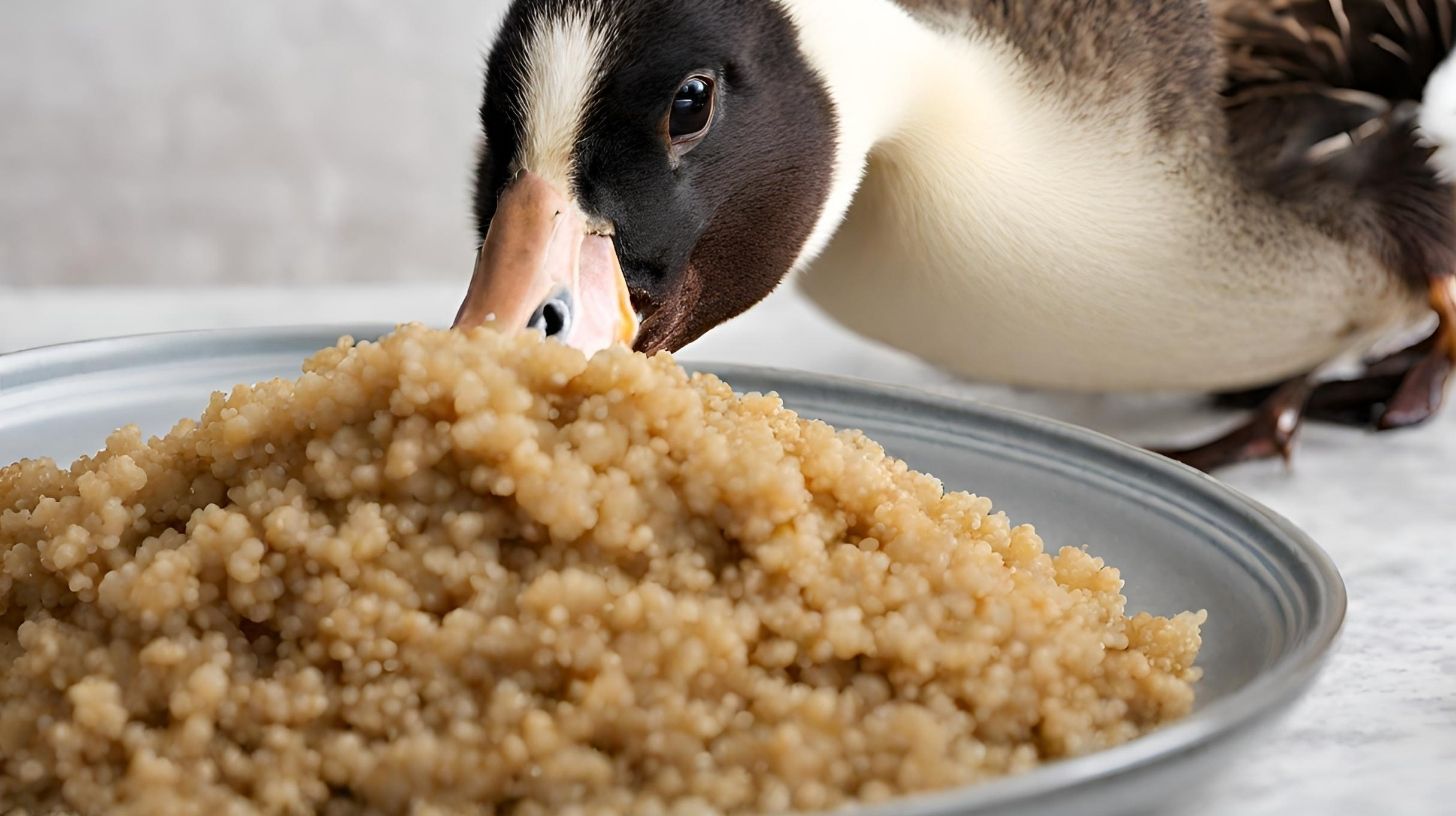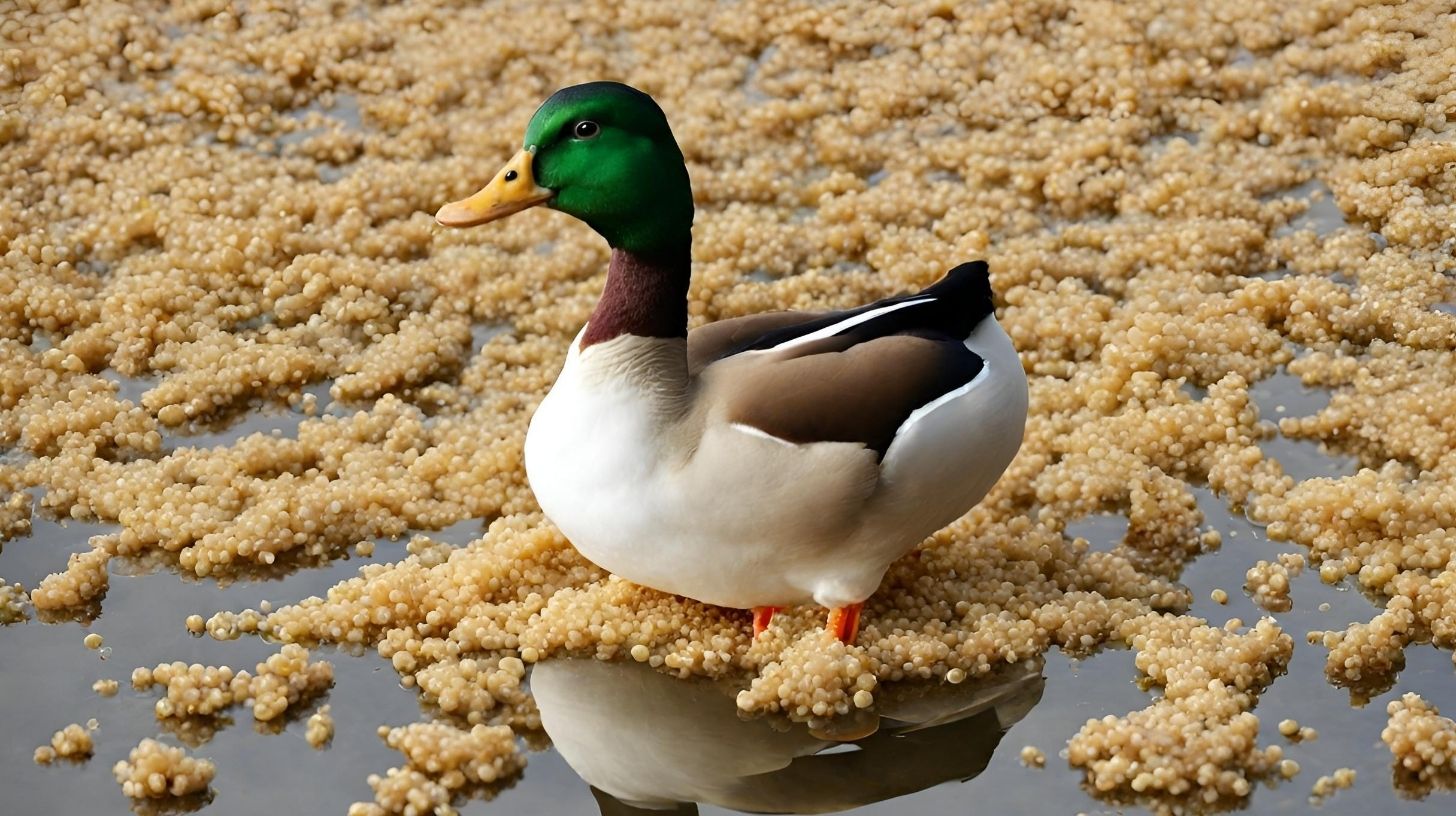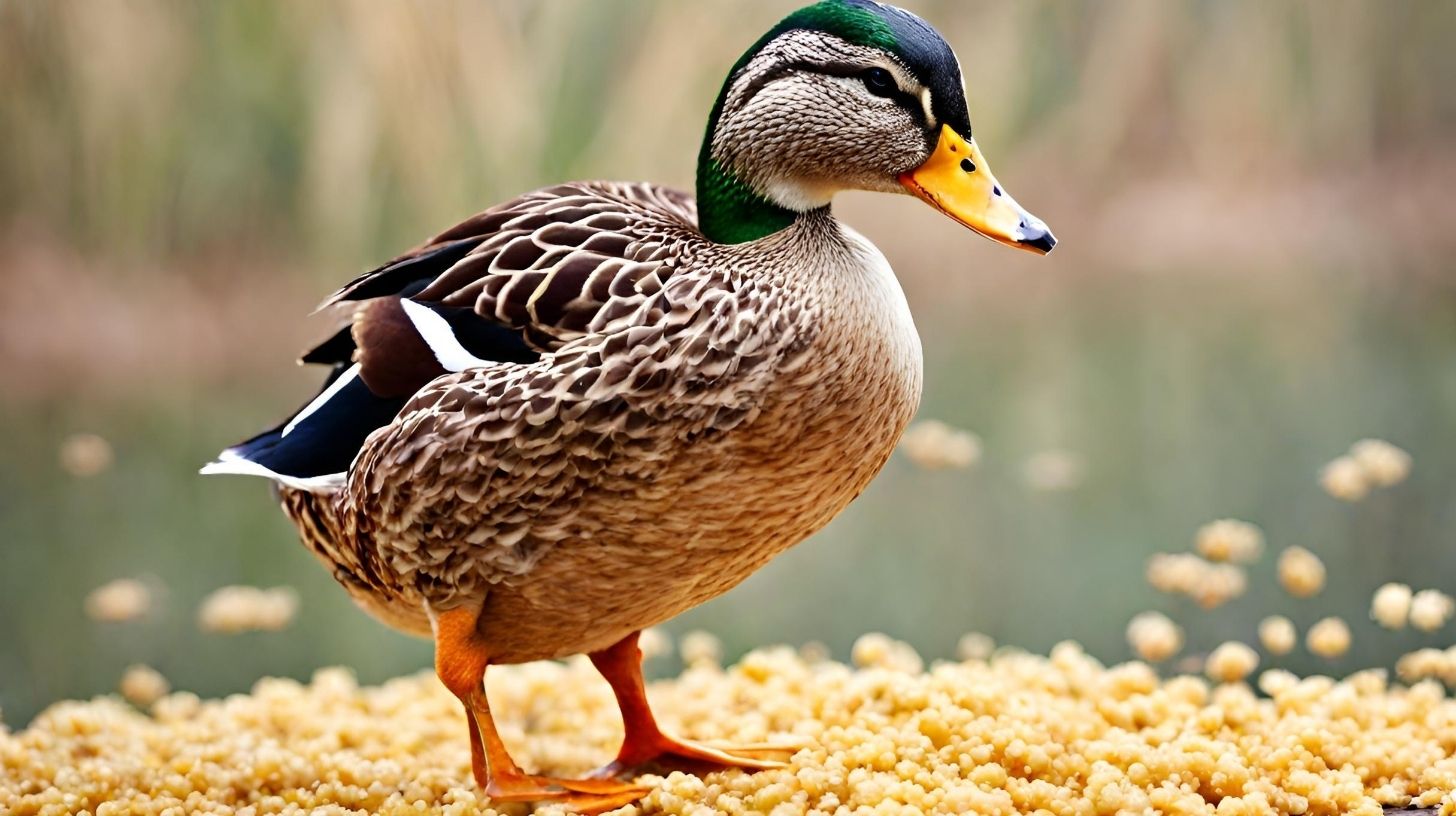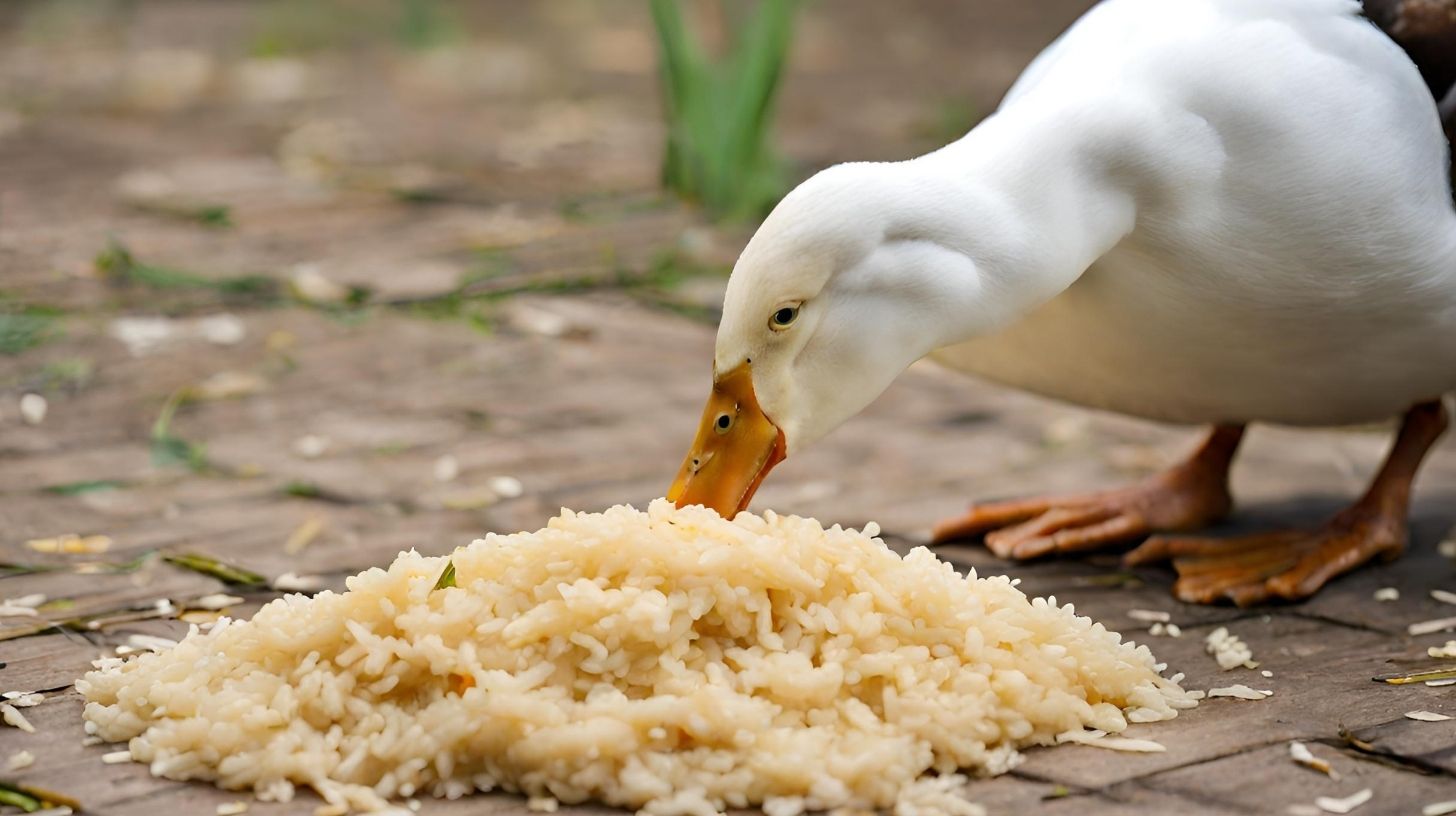Can Ducks Eat Quinoa? A Complete Feeding Guide

Table of content:
- Can Ducks Have Quinoa?
- Is Quinoa Good for Ducks?
- Do Ducks Like to Eat Quinoa?
- What Do Ducks Eat Besides Bread?
- Should I Feed Ducks Quinoa?
- What Human Foods Can I Feed Ducks?
- What Snacks Can I Give My Ducks?
- What Vegetables Can Ducks Eat?
- Can I Feed My Duck Quinoa?
- Is Quinoa Safe for Ducks?
- Quinoa Feeding Guide
- Quinoa Nutrition Facts
- Can Ducks Eat Uncooked Quinoa?
- Can I Feed Ducks Under Two Months of Quinoa?
- How Much Quinoa Should I Feed My Ducks?
- Can Ducks Eat Quinoa Everyday?
- Quinoa Feeding FAQs
- Conclusion
Quinoa has become a popular “superfood” for humans thanks to its high amounts of protein, fiber, and various vitamins and minerals. But is quinoa also a healthy treat for our feathered friends like pet ducks or ducks in the backyard flock?
The short answer is yes, ducks can eat quinoa in moderation as part of a varied diet. However, there are some important considerations regarding preparation and portion size.
Key Takeaways:
- Quinoa is generally safe for ducks to eat in moderation as part of a balanced diet. It provides protein, nutrients, and fiber.
- Soaking or sprouting quinoa improves digestibility and nutrient absorption for ducks. Avoid feeding uncooked quinoa.
- Quinoa should be just a small part of a duck’s diet. Focus on providing ducks with natural foods like greens, vegetables, fruits, seeds, and insects.
- Feed no more than 1-2 tablespoons of cooked quinoa per duck per day as an occasional treat. Too much can cause digestive upset.
- Always provide grit to help ducks digest fibrous foods like quinoa. Clean, fresh water is vital as well.
Read on to learn all you need to know about feeding quinoa to ducks.
 Can Ducks Have Quinoa?
Can Ducks Have Quinoa?
Quinoa is generally considered safe for ducks to consume when eaten in small quantities. In fact, it can provide some nutritional benefits.
According to poultry experts, treats like quinoa should make up no more than 5-10% of a duck’s total daily food intake. The bulk of their diet – about 80-90% – should still come from their natural diet of insects, bugs, seeds, grains, aquatic plants, and greens.
When feeding treats like quinoa, moderation is key. More than a tablespoon or two per duck can potentially cause digestive upset.
Here’s an overview of the pros and cons of ducks eating quinoa:
Pros:
- High in protein, amino acids like lysine, and fiber
- Provides B vitamins, iron, magnesium, zinc, potassium, and antioxidants
- Adds variety to diet
- Can sprout quinoa for extra nutrition
Cons:
- High in saponins which can cause upset stomach
- Raw quinoa is hard to digest
- Can interfere with nutrient absorption if overfed
- Duck’s natural foods provide a balanced diet
So in short – yes, ducks can certainly eat quinoa, but it should be cooked and fed sparingly as a supplemental treat a few times a week at most.
 Is Quinoa Good for Ducks?
Is Quinoa Good for Ducks?
Quinoa offers some nutritional benefits that make it a fine occasional addition to a duck’s diet in small amounts.
Here are some of the main nutrients found in quinoa that can support duck health:
- Protein – Quinoa contains all 9 essential amino acids, making it a complete protein source. The amino acid lysine is especially important for poultry. Protein helps ducks build strong muscles and feathers.
- Healthy Fats – The fats in quinoa provide fatty acids like linoleic acid which are important for duck’s skin and feathers. The grain also contains antioxidants that support immune health.
- Fiber – Quinoa is higher in fiber compared to some other cooked grain treats like rice or pasta. Fiber aids duck digestion but too much can cause issues.
- B Vitamins – Quinoa offers B vitamins like riboflavin and folate. B vitamins help ducks convert food into energy.
- Minerals – Quinoa provides minerals like iron, magnesium, and zinc which support bone health, red blood cell production, immunity, and more.
However, while quinoa can make a fine supplemental addition to a duck’s diet, it cannot and should not replace their natural wild foods which provide the full spectrum of nutrients ducks need.
Do Ducks Like to Eat Quinoa?
In general, most ducks seem to enjoy eating quinoa in moderation when it is cooked and mixed into their diet.
Ducks have only around 100 taste buds compared to a human’s 9,000. So they are not quite as picky and are willing to sample many different foods.
Here are some signs your ducks enjoy quinoa:
- They eat the quinoa readily when mixed into their feed
- They make contented noises like purring when eating it
- They come running eagerly when being fed quinoa
However, each duck has its personal preferences. Be sure to introduce new treats slowly. And cease feeding it if any ducks show signs of disinterest, such as:
- Ignoring the quinoa when mixed into their feed
- Spitting it out
- Having loose droppings after eating it
Their health and comfort comes first so let their preferences guide you on which treats they enjoy. Feed no more than a small amount per duck a few times a week.
What Do Ducks Eat Besides Bread?
Bread should never make up a substantial part of a duck’s diet. Ducks have complex nutritional needs that bread simply cannot meet.
Here are some healthy foods ducks naturally eat in the wild to meet their nutritional requirements:
Greens/Vegetables:
- Duckweed, water hyacinth, water lettuce
- Grasses
- Aquatic plants like parrot feather, azolla, frogbit, watercress
- Seaweed
- Lettuce, kale, spinach, chard
- Celery, cucumber, zucchini
Fruits:
- Berries like strawberries, blackberries, raspberries (chopped)
- Cantaloupe, honeydew melon
- Apples, pears (chopped)
- Tomatoes, squash, pumpkin, sweet potato (cooked)
Seeds/Grains:
- Oats, rice, barley, wheat berries
- Corn, peas, bean sprouts
- Flax, hemp, chia, sunflower seeds
- Millet, sorghum
Protein:
- Mealworms, crickets, maggots
- Aquatic snails, shrimp, small fish
- Earthworms, grubs, larvae, small frogs, lizards
This diverse mix of natural plant and animal foods supplies the full array of amino acids, fatty acids, vitamins, and minerals essential for duck health. An occasional small serving of cooked quinoa can add variety.
Should I Feed Ducks Quinoa?
Quinoa can be fed to ducks in moderation as an occasional supplemental treat 2-3 times per week at most. But it should never become a duck’s main food.
Here are some tips on how to feed quinoa safely:
- Cook it – Raw quinoa contains saponins which irritate digestion. Rinse and then boil, steam, or simmer quinoa before feeding.
- Limit portions – No more than 1-2 tablespoons of cooked quinoa per duck per feeding, 2-3x week max. Too much can lead to diarrhea or malnutrition.
- Mix it in – Mix a small amount of quinoa into their regular feed to encourage sampling. Don’t force a duck to eat it.
- Supervise – Watch while they eat to be sure every duck is tolerating it well. Cease feeding if any show signs of tummy upset.
- Provide grit – Offer insoluble grit like sand, oyster shell, and granite grit to help grind fibrous foods.
- Keep their diet diverse – Quinoa should never replace diverse greens, veggies, fruits, and proteins. Focus on those!
Quinoa can add variety but it truly is not essential or required in a duck diet. Skip it if your ducks show disinterest or any intolerance. Their natural foods are best.
What Human Foods Can I Feed Ducks?
Ducks should get most of their nutrition from species-appropriate natural foods. But very small amounts of certain human foods can be fed safely as supplemental treats.
Some human foods ducks can eat in moderation include:
- Cooked whole grains – Oats, brown rice, barley, wheat berries, couscous.
- Cooked beans, peas, corn.
- Chopped low-acid fruits – Berries, melon, apple.
- Cooked sweet potato or squash.
- Cooked egg scrambled or hard-boiled.
- Leafy greens – Lettuce, kale, chard.
- Fresh sprouts – Bean, wheat, lentil.
Avoid feeding ducks these human foods:
- Bread, chips, crackers, popcorn, donuts, junk food.
- Raw dried beans or grains.
- Avocado, citrus fruits.
- Onions, garlic, chocolate, caffeine.
- Processed meats, and salty foods.
- Moldy, rotten, or spoiled foods.
When in doubt, stick to a duck’s natural diet for the bulk of their nutrition. Offer just a bite or two of any human food as a rare treat to add diversity. Focus on healthy whole foods.
What Snacks Can I Give My Ducks?
Ducks enjoy snacks as occasional treats, but their main diet should still come from species-appropriate foods. Follow these tips for healthy duck snacking:
- Offer small pieces of chopped fruits like melon, berries, apples.
- Try a few oats, wheat berries, chopped greens, or bean sprouts.
- Scramble an egg and mix in small chunks for them to nibble.
- Sprinkle mealworms, crickets, or maggots into their enclosure.
- Float a few thawed frozen peas or corn kernels in their pond.
- Mix sprouted lentils, wheat berries, or chickpeas into their feed.
Avoid starchy, salty, sugary human snack foods. Portion any treats for ducks carefully. No more than a bite or two per duck at a time, 2-3 times per week at most.
Let the ducks’ preferences guide you. Not all ducks like the same snacks. Stay alert for any signs of digestive upset after introducing new treats. Their overall health and wellbeing come first.
What Vegetables Can Ducks Eat?
Ducks can eat a wide variety of fresh vegetables as part of a balanced diet. Vegetables provide valuable vitamins, minerals, antioxidants, and fiber.
Some vegetables ducks can eat include:
- Leafy greens – Lettuce, spinach, kale, chard, arugula
- Celery, cucumber, zucchini, squash
- Root veggies – Carrots, sweet potato, beets (cooked)
- Fresh sprouts – Bean, pea, wheat, lentil
- Fresh corn, green beans, peas, parsnips
- Seaweed – Nori, kombu, dulse
Vegetables should be chopped for ducklings or ducks with smaller bills. Cook any harder vegetables to soften them.
Rinse greens and vegetables well. Avoid any vegetables that have gone rotten. Introduce new veggies slowly and monitor the duck droppings to ensure they don’t cause digestive upset.
While vegetables make great supplemental treats, a duck’s main diet should still come from species-appropriate foods like fresh greens, fruits, proteins, seeds/grains. Strive for variety!
Can I Feed My Duck Quinoa?
You can safely feed your duck a small amount of cooked quinoa as an occasional treat. But it should not become a staple food or replace their natural diet.
Follow these tips for feeding quinoa to pet ducks:
- Rinse quinoa well and then cook it thoroughly until fluffy. This reduces saponins.
- Limit portions to no more than 1-2 tablespoons per duck, 2-3 times per week. Too much can lead to diarrhea or malnutrition.
- Mix just a sprinkling of quinoa into their regular food at first to encourage sampling.
- Introduce slowly and watch for any signs of digestive upset like loose droppings.
- Provide insoluble grit like sand or oyster shell to help grind fibrous foods.
- Ensure they have constant access to fresh, clean water.
- Make quinoa just a supplemental treat – focus on diverse greens, veggies, fruits, and proteins.
With small portions and proper preparation, quinoa can be a fine occasional addition to a pet duck’s diet. But always ensure the bulk of their food comes from natural sources to provide balanced nutrition. Monitor closely for any intolerance.
Is Quinoa Safe for Ducks?
Quinoa is generally considered safe for ducks to eat when consumed properly cooked in small quantities. But there are some important feeding guidelines to follow:
Cook it – Raw quinoa contains bitter-tasting saponins that can irritate digestion. Always cook quinoa before feeding to ducks.
Limit portions – Feed tiny portions infrequently, no more than 1-2 tablespoons per duck 2-3 times per week max. Too much can lead to diarrhea.
Prevent malnutrition – Don’t let quinoa displace more nutritious natural duck foods from their diet like greens, veggies, and fruits.
Avoid cross-contamination – Wash hands and prep area to avoid spreading bacteria. Don’t allow ducks to contaminate the uncooked quinoa.
Watch for intolerance – Monitor ducks closely when first feeding quinoa. Discontinue use if any duck shows signs of digestive upset.
Offer grit – Provide insoluble grit like granite or oystershell to help grind fibrous foods.
When fed properly cooked in strict moderation, quinoa is generally safe for ducks. But it is not an essential or required part of their diet. Monitor closely and let your duck’s preferences guide you.
Quinoa Feeding Guide
If you wish to try incorporating quinoa as a small part of your duck’s diet, follow these feeding guidelines:
Portion: No more than 1-2 tablespoons cooked quinoa per duck, 2-3 times per week maximum.
Preparation: Rinse quinoa very well. Cook until fluffy by boiling, steaming, or simmering. Let cool before feeding.
Mix It In: Mix just a small amount of quinoa into their regular food at first to encourage interest.
Supervise: Stay present while feeding to monitor all ducks’ tolerance. Stop immediately if any duck shows signs of digestive upset.
Natural Diet: Ensure the bulk of diet still comes from diverse greens, veggies, fruits, proteins. Quinoa is just a supplemental treat.
Provide Grit: Offer insoluble grit like granite or oystershell to aid digestion of fibrous foods.
Clean Water: Always provide fresh, clean drinking water. Change water at least twice daily.
With proper precautions, limited portions, and close monitoring, quinoa can offer a nutritional boost and add variety to a duck’s diet in moderation.
Quinoa Nutrition Facts
Here is the nutrition profile of cooked quinoa per 1 cooked cup (185g):
- Calories: 222
- Protein: 8g
- Carbohydrates: 39g
- Fiber: 5g
- Sugars: 2g
- Fat: 3.5g
- Saturated Fat: 0.5g
- Monounsaturated Fat: 1.1g
- Polyunsaturated Fat: 1.3g
- Iron: 2.8mg 15% DV
- Magnesium: 118mg 30% DV
- Phosphorus: 281mg 28% DV
- Manganese: 1.3mg 58% DV
- Folate: 77.7mcg 20% DV
- Copper: 0.3mg 18% DV
- Zinc: 2.2mg 15% DV
- Potassium: 563mg 16% DV
Quinoa is high in protein, fiber, B vitamins like folate, and minerals like iron, zinc, and magnesium. It makes a suitable supplemental treat for ducks in moderation.
Can Ducks Eat Uncooked Quinoa?
It’s best to avoid feeding ducks raw quinoa. Uncooked quinoa contains saponins, compounds that give quinoa a bitter taste and can be an intestinal irritant.
While a small amount of saponins are unlikely to harm an adult duck, they can cause minor digestive upset resulting in loose, smelly droppings.
Cooking quinoa thoroughly reduces the saponin content and also makes the protein and nutrients more bioavailable to ducks.
If you want to sprout quinoa for ducks, that is fine since the sprouting process reduces saponins. Just be sure to rinse the sprouts extremely well before feeding.
Only offer tiny portions of cooked quinoa to ducks, no more than 1-2 tablespoons per duck 2-3 times weekly maximum. Their natural diet is still ideal to provide balanced nutrition.
Can I Feed Ducks Under Two Months of Quinoa?
Special care and precautions should be taken when feeding ducklings under 2 months of age:
- Avoid offering quinoa until ducklings are at least 4-6 weeks old. Their digestive systems are too immature before then.
- Mix just a tiny pinch (1/8 teaspoon) of well-cooked, cooled quinoa into their starter feed to begin.
- Rinse sprouted quinoa very thoroughly then chop finely if feeding sprouted quinoa.
- Monitor very closely for any signs of digestive upset or loose droppings. Discontinue use if any intolerance.
- Ensure grit is available to aid digestion.
- Let preferences guide you. Not all ducklings like or tolerate quinoa.
- The bulk of their diet should still be duck starter feed and insects. Quinoa is just an occasional treat.
Baby ducks have sensitive digestion and very specific nutritional needs. For the first few weeks of life, commercial duck starter feed and insect proteins should make up the vast majority of their diet. Small amounts of cooked quinoa can provide extra nutrition after 4-6 weeks old but portion sizes must be extremely small, fed minimally, and tolerance closely monitored.
How Much Quinoa Should I Feed My Ducks?
When feeding quinoa to ducks, tiny portions fed infrequently are key to safety:
- No more than 1-2 tablespoons cooked quinoa per adult duck
- Feed this amount just 2-3 times per week maximum
- For ducklings under 2 months, start with just a pinch (1/8 teaspoon)
Even when portioned properly, all ducks should be monitored closely for signs of digestive upset like loose droppings, lack of appetite, or lethargy after eating quinoa.
If any intolerance is observed, cease quinoa feeding immediately. Quinoa should never displace or interfere with the consumption of a duck’s healthy natural diet.
Quinoa’s nutrient profile is not unique enough to be an essential addition to a duck’s diet. tiny portions as an occasional treat is sufficient for adult ducks to reap benefits without risking overfeeding. Strict moderation is key.
Can Ducks Eat Quinoa Everyday?
It’s best not to feed quinoa to ducks daily or in large amounts. Quinoa contains saponins and phytate compounds that can irritate digestion if over-consumed.
Here are reasons to limit quinoa feeding frequency and portions for ducks:
- Saponins – Bitter compounds that can irritate digestion. Cooking reduces but does not eliminate them.
- Phytates – Can bind to nutrients and inhibit full absorption. Soaking/sprouting helps reduce.
- Oxalates – May bind to calcium limiting absorption. Soaking helps decrease oxalates.
- Fiber – Too much dietary fiber from grains like quinoa can impact digestion.
- Balanced Diet – Ducks require a diverse mix of greens, veggies, fruits, proteins. Quinoa is not a necessity.
- Allergy Risk – Frequent, heavy feeding of any one food may increase allergy risk. Variety is key.
For optimal duck health and nutrition, quinoa should be fed in strict moderation – no more than 1-2 tablespoons per duck just 2-3 times per week at most. Monitor closely for any intolerance. Their natural diet is best!
Quinoa Feeding FAQs
Can quinoa hurt ducks?
Quinoa is unlikely to harm ducks when fed properly cooked in very small amounts infrequently. But overfeeding it could lead to saponin toxicity or nutritional imbalances. Strict moderation is key.
Do I have to soak quinoa before feeding ducks?
Soaking, sprouting, or fermenting quinoa before feeding ducks can help reduce saponins, phytic acid, and other anti-nutrients. However, cooking alone also reduces these compounds substantially. So soaking is beneficial but not mandatory if cooking thoroughly.
Can I feed raw quinoa to ducks?
It’s best not to feed raw quinoa to ducks since cooking helps remove saponins which can irritate digestion. Cook quinoa before feeding by simmering, steaming, or boiling until fluffy.
How long does cooked quinoa last for ducks?
For food safety, cooked quinoa meant for ducks should be used right away or refrigerated and used within 3-5 days. Discard any uneaten portions promptly. Do not leave sitting out for extended periods.
Can ducks have quinoa everyday?
A: It’s best not to feed quinoa daily, but instead 2-3 times per week maximum in tiny portions of 1-2 tablespoons per duck. Variety is important, and quinoa is not an essential dietary addition. Monitor closely for any intolerance.
Conclusion
In conclusion, adult ducks can enjoy tiny portions of cooked quinoa as an occasional supplemental treat a few times a week. It provides extra protein, nutrients, and fiber. But strict moderation is crucial, and quinoa should never replace diverse natural duck foods. Pay close attention to each duck’s individual tolerance. Discontinue use if any negative reactions are observed. Prioritize a varied, balanced diet, and use quinoa sparingly to reap benefits without risks.
Welcome. I’m Adreena Shanum, the proud owner of this website, and I am incredibly passionate about animals, especially poultry. I founded adreenapets.com as a labor of love, stemming from my desire to share my knowledge and experiences with poultry enthusiasts worldwide.




